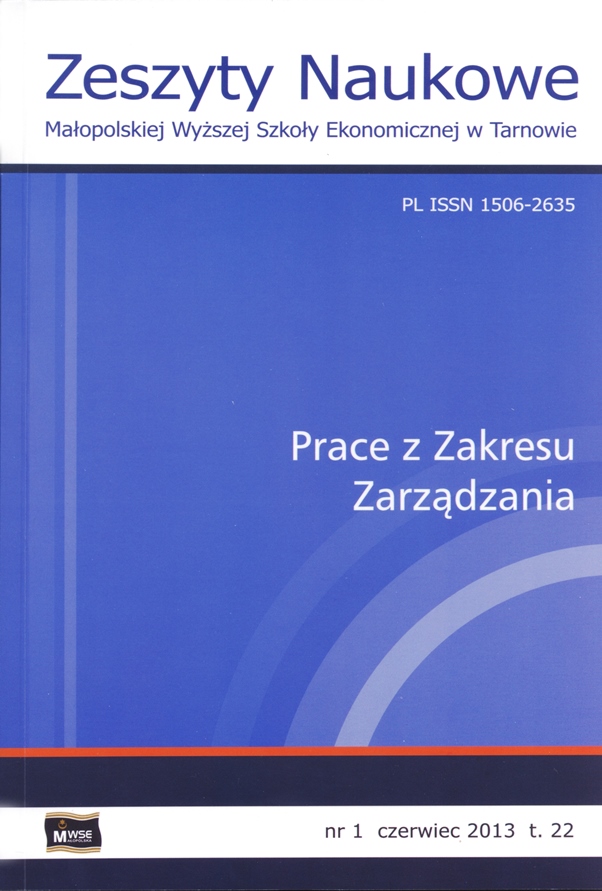Abstract
In the highly competitive market the rational management of human resources is of great importance to a company. The success of the company in the market is the result of proper selection, motivation and maintaining competent staff who will best fulfil its objectives. The need for innovation and adapting to the changes required by the company include the use of new forms of management and flexible employment structures. Flexible forms of employment adjust the number and kind of employees to quantitative, qualitative and temporal needs of work in varying environments. They lead to full utilisation of potential and working time of the employees and allow for lower operating costs. The model of “flexible firm” determines the optimal employment.
The article is devoted to the issues concerning the development of an optimal structure of employment on the basis of the concept of flexible business management. It explains the main definitions related to human resources management and evaluates factors affecting changes in the level and structure of employment in Polish enterprises. It also discusses the model of flexible firm and flexible forms of employment, increasingly used by companies. The reflections were based on the analysis of literature and current practices in enterprises.
References
Armstrong M., Zarządzanie zasobami ludzkimi: strategia i działanie, przeł. M. Loska, Wydawnictwo Profesjonalnej Szkoły Biznesu, Kraków 1996. ISBN 83-85441-15-8.
View in Google Scholar
Atkinson J., Manpower Strategies for Flexible Organizations, „Personnel Management” 1984, no. 8.
View in Google Scholar
Beardwell I., Holden L., Human Resources Management: A Contemporary Perspective, Pitman Publishing, London 1997.
View in Google Scholar
Bielski I., Zasoby ludzkie w przedsiębiorstwie innowacyjnym, „Zarządzanie Zasobami Ludzkimi” 2007, nr 5(53).
View in Google Scholar
Borkowska S., Główne wyzwania wobec problemów pracy na przełomie wieków. W: Praca i polityka społeczna w perspektywie XXI wieku, IPiSS, Warszawa 1998. ISBN 83-907327-8-5. Górniak J., Mazur S. (red.), Zatrudnienie w deklaracjach i opiniach pracodawców: analiza wyników badań ankietowych przeprowadzonych wśród przedsiębiorców w ramach projektu Obserwatorium Regionalnych Rynków Pracy Pracodawców Rzeczypospolitej Polskiej, Raport 1 [Warszawa 2010].
View in Google Scholar
Handy Ch., Understanding Organizations, Oxford University Press, New York 1993. ISBN 0195087321.
View in Google Scholar
Jacukowicz Z., Kompleksowe zarządzanie pracą, Ośrodek Doradztwa i Doskonalenia Kadr, Gdańsk 2004. ISBN 83-7187-866-4.
View in Google Scholar
Juchowicz M., Rostkowski T., Sienkiewicz Ł., Narzędzia i praktyka zarządzania zasobami ludzkimi, Poltext, Warszawa 2003. ISBN 83-88840-34-7.
View in Google Scholar
Kryńska E. (red.), Elastyczne formy zatrudnienia i organizacji pracy a popyt na pracę w Polsce, IPiSS, Warszawa 2003. ISBN 83-87890-42-1.
View in Google Scholar
Laskowski W., Racjonalizacja zatrudnienia w przedsiębiorstwie, PWE, Warszawa 1987. ISBN 83-208-0650-X.
View in Google Scholar
Makowski K., Optymalne zatrudnienie a konkurencyjność, „Materiały i Prace Instytutu Funkcjonowania Gospodarki Narodowej” 2000, t. 79, s. 147–156.
View in Google Scholar
Mercer M .W., Dział kadr jako centrum zysków, „Management” 1996, nr 12.
View in Google Scholar
Olędzki M ., Polityka zatrudnienia, PWE, Warszawa 1978.
View in Google Scholar
Patulski A., Nietypowe formy zatrudnienia, „Monitor Prawa Pracy” 2007, nr 2.
View in Google Scholar
Pocztowski A., Zarządzanie zasobami ludzkimi, Zakład Narodowy im. Ossolińskich, Wrocław 1996. ISBN 83-04-04318-1.
View in Google Scholar
Pocztowski A., Zarządzanie zasobami ludzkimi: strategie ‒ procesy ‒ metody, PWE, Warszawa 2003. ISBN 83-208-1468-5.
View in Google Scholar
Sajkiewicz A. (red.), Zasoby ludzkie w firmie: organizacja, kierowanie, ekonomika, Poltext, Warszawa 2000. ISBN 83-86890-77-0.
View in Google Scholar
Vallas S., Rethinking Post-Fordism: The Meaning of Workplace Flexibility, „Sociological Theory” 1999, no. 68.
View in Google Scholar
Walkowiak R., Zarządzanie zasobami ludzkimi: kompetencje, nowe trendy, efektywność, Towarzystwo Naukowe Organizacji i Kierownictwa „Dom Organizatora”, Toruń 2007. ISBN 978- 83-7285-327-1.
View in Google Scholar
© Copyright by Małopolska School of Economics in Tarnów. The articles are available under the Creative Commons Attribution NonCommercial-NoDerivatives 4.0 International License


